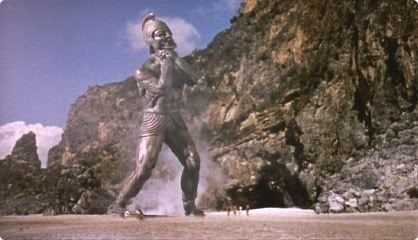To those less enamoured of the economic realities of the world today, things might seem pretty bleak.
We've witnessed the destruction wrought by the big risk-takers and deregulators, those who stand for an unblinking faith in 'experts' and suit-wearing leaders; those who oppose all fetters in the name of freedom, and who think that the consequent risks can be managed.
Yet it's unlikely that these people will go away. There is a renewed consciousness of the need for regulation and moderation, but business culture remains as people continue to buy into it. There's a persistent love for the well-dressed, for achievers, success stories and unlimited accumulation – the Faustian of Spengler actualised; a penchant for concepts and the infinite with little regard for reality.
Who can stand against the colossi who bestride the world, at whose legs we merely peep about to find ourselves dishonourable graves?
From my experience, the average Joe is typically of the opinion that the old Left is a thing of the past. Didn't Communism effectively end with the collapse of the Berlin Wall? And the more astute might observe that developments such as Reaganomics and Thatcherism, as part of a general shift towards the right in the developed world, indicate that capitalism has inexorably triumphed.
History has ended, and it ended at Wall Street.Now the opposition, it seems, is chiefly between the Right and the New Left. The latter is an umbrella for various causes ranging from women's rights to environmentalism, causes that are frequently allied but do not form a unified front. Most coherently, it is embodied by people with progressive sensibilities who are labelled as 'liberals'. These people are opposed to the markedly right-wing but are often inherently capitalistic. Thus, they are perhaps best described as left-of-centre or even centrist.
Significantly, however, they do not have a strong opposition towards the fundamental characteristics of bourgeois-capitalist thinking. They are also frequently misled by positivism, by a tendency towards abstraction and spiritualism, or by a false sense of independence. Thus, in principle, they represent merely variations of the ideas of the ruling class.
And thus, from the perspective of political ideology, their opposition is not truly dialectical. Consequently, it cannot be truly transformative.
However, I submit that to think in such terms is to deviate from dialectical materialism. As Georg Lukács put it, "It is not men’s consciousness that determines their existence, but on the contrary, their social existence that determines their consciousness." As I interpret it, this implies that the struggle against the social framework of naked capitalism follows from our economic conditions of existence. In effect, we have to look at what is made possible by economic stimuli that push people into action, rather than how ideological currents drive people.
Class struggle embodies the conflict between advancing mode of production and restraining social relations. I think the conflict is intensified when the prevailing social relations actually threaten to undermine the current mode of production. Witnessing the threat posed by modern capitalism to economic stability and survival is a wake up call for many people. Now more aware of dangers inherent in a 'free' market that is dictated by profiteering entrepreneurs, people are calling for greater regulation, smaller corporations, and the abolition of reckless risk-taking.
I think this should be regarded as a movement in the struggle. It has the potential to nudge the focus away from individuals, in the form of industry leaders, and towards the masses, brought about by greater state oversight and the increased strength of workers relative to smaller companies.
I think this should be regarded as a movement in the struggle. It has the potential to nudge the focus away from individuals, in the form of industry leaders, and towards the masses, brought about by greater state oversight and the increased strength of workers relative to smaller companies.
As such, I think anyone who is interested in social change should join hands and put their collective weight behind this development. Ideological currents do not often hold people together for long, and there is no use sitting down and waiting for a revolution. Marx himself seems to have disparaged Ultra-Leftists who refused to work with reformists. Left or New Left, we should be interested in improving the economic conditions of the masses, and this can be achieved in some measure by taking power away from the conmen and the charlatans who have controlled the government in past decades.
This could be a chance to undo past reverses and make another step forward.As for the undying business culture, there is no need to resign ourselves to it. We must cultivate the seeds of resentment that have been sown. This is our side of the culture war. Now that the men in suits are down, albeit only slightly, it's time to press the advantage. We must again join forces with all who are of similar mind to show that the myth of the entrepreneurial Atlas is poison to economic well-being, that the world of business is not the world of the seeing, and that solidarity rather than selfish profit-seeking is the path of stable progress.
Let the precarious economic conditions of the day lead our way. There is hope in solidarity of action. And there is hope for a gradual progress towards a better society.

(0) Comments
Post a Comment